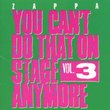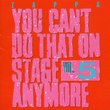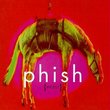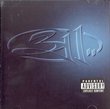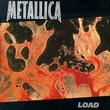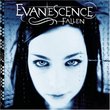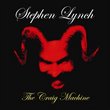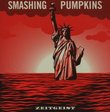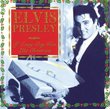| All Artists: Frank Zappa Title: You Can't Do That On Stage Anymore - Vol. 6 Members Wishing: 3 Total Copies: 0 Label: Zappa Records Release Date: 5/30/1995 Album Type: Original recording remastered, Live Genres: Alternative Rock, Jazz, Special Interest, Pop, Rock, Classic Rock, Metal Styles: Jazz Fusion, Comedy & Spoken Word, Experimental Music, Progressive, Progressive Rock, Album-Oriented Rock (AOR) Number of Discs: 2 SwapaCD Credits: 2 UPC: 014431057120 |
Search - Frank Zappa :: You Can't Do That On Stage Anymore - Vol. 6
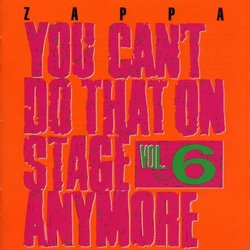 | Frank Zappa You Can't Do That On Stage Anymore - Vol. 6 Genres: Alternative Rock, Jazz, Special Interest, Pop, Rock, Classic Rock, Metal |
Larger Image |
CD DetailsSimilar CDsSimilarly Requested CDs
|
Member CD ReviewsReviewed on 2/4/2007... Zappa, live. 'Nuff said.
CD ReviewsSome great tracks kireviewer | Sunnyvale, Ca United States | 05/22/2002 (4 out of 5 stars) "This is the last volume of the series. It contains two CD's, each over 70 minutes long. As with the other albums in the series, it is very good but not great. There is too much talking and very few surprises. Almost all of the songs can be heard elsewhere. And these live versions aren't much different than other live versions already on record. He also concentrates too much on certain bands, especially from the Ike Willis era. There are very few or no tracks from the great Adrian Belew, Becker Brothers or Jean Luc Ponty bands. Some songs are repeated a number of times throughout the series, such as the Torture Never Stops.Better live CD's to get would be Make a Jazz Noise Here, The Best Band You Never Heard, and many of the "Beat the Boots" Unfortunately, most of the Beat the Boots CD's have the best concert performances, but the worst sound. Vol 5 of this series is interesting because it contains some very old Mothers material.Volume 6 comes from a wide variety of bands from the early seventies through the eighties. There are some tracks from bands that haven't been represented before, such as the Belew and Becker bands. But, there are only a few of those tracks and they are mostly short. One of the best things about this volume is that it only has a few songs that were repeated from earlier volumes.The first CD of volume 6 contains songs about sex. Included is a bunch of intros where Zappa talks to the audience and two audience participations. The talking parts are very amusing, but you only need to hear them once or twice. There are some very good and unique versions of a few songs on this disc.Disc 2 seems to be the leftovers. Every popular tune that hadn't already been included in the series. But, there are a few nice surprises, such as the fantastic tracks featuring Shankar on violin.I think this is one of the best volumes in the series. The tracks chosen are very lively and full of energy. The only real downside is too much talking." FZ Journal # 13 Jeff Hodges | Denton, TX United States | 06/21/2005 (4 out of 5 stars) "As his last volume in this series, it seems quite obvious that Frank was getting in his last laugh. From the very beginning of Disc one and the "Anti-Smut Loyalty Oath", followed by the infamous "Poodle Lecture" (a meeting of several conceptual continuity clues), he seems set on making a disc that is "about sex" (as he admitted in the liner notes). Disc 1 contains some of Franks most hysterical and conceptually relevant live monologues. "White Person" is a good example of the audible effects of Frank's improvisatory conducting style, and "Make a Sex Noise" shows how Frank could play the crowd.
Although the first disc of Vol 6 might be the key to the mythology of Frank's sexual metaphors, disc two sees some of Frank's least accessible stuff. It introduces itself as largely instrumental and improvisatory. The version of "Catholic Girls" here really brings out the best that Ike Willis had to offer. The voice of Joe come up really clearly here, and his backups really bring out the best of Frank's mastery of traditional harmony with the "don't bother Mary" chunk that outlines relatively traditional resolution practices. The voice of the Central Scrutinizer makes an appearance here, too, and the subsequent inclusion of "Crew Slut" is an extension of the "Joe's" storyline. A music education lesson happens in the track "Thirteen". One two One two three one two three four seems almost like a tala based on the Indian idea of an additive phrase, and the entire solo is over a single chord. Frank is also joined on stage by the Indian violinist Shankar. Shankar's background is in the Carnatic style, which uses ragas as a source of melodic expression. It would be interesting to see if Shankar was playing in a raga, and if so, which one. In fact, this is something that I have thought about Zappa recently. It is actually quite rare that we get to hear him over chord changes. Is there a similarity between the expressiveness of raga-based music and the rhythmic displacement that they use to create tension and release in Zappa's methods of improvisation? We're Turning again almost comes off as a tribute to the `60's and his place in it. It seems like it could almost be nostalgic, which begs the question about Zappa's theory that nostalgia is a potentially destructive force in the universe. I still hold that Zappa's stuff is addicting. The more it is scrutinized, the more you feel that you could finally "get it", but the carrot keeps moving just out of reach. " |




